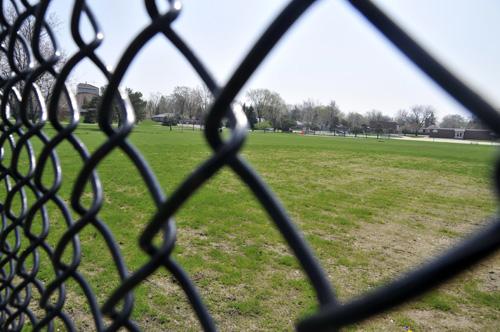Champaign attempts to curb crime

April 24, 2008
The city of Champaign responded to last summer’s increased youth crime by implementing programs to engage youth in the Garden Hills neighborhood and keep them out of trouble.
“Operation Hope in Garden Hills” is a result of the higher crime rate, believed to be from the lack of structured activities, and part of a Champaign City Council goal to improve the overall quality of life in the city.
Becky Restad, Garden Hills Elementary secretary, said she has watched the quality of life for youth in the area decline between the time she raised her children in the neighborhood and now, as she is helping raise her grandchildren.
“As the city started expanding, our parks (started) deteriorating and we don’t have anything to offer our kids anymore,” she said. “They need to revitalize it.”
Adding programs and bringing people back into the Garden Hills neighborhood will provide children with something to do, Restad said. She said she has noticed kids walking on the streets and vandalizing the property. She said she hopes the program will dissolve the negative stigma surrounding the area.
Get The Daily Illini in your inbox!
The initiative was designed to benefit Champaign Unit 4 School District students living in the neighborhood, a high crime area bordered by McKinley, Bradley and Mattis streets, said Joan Walls, assistant city manager for community relations.
Walls said neighborhood residents urged the city to take action and provide programming for youth. Although there are no statistics outlining the increased crime in the neighborhood, it is acknowledged by the city, school district and police department that crime is prevalent among the youth.
Previously, there were not enough activities for children, and Council members agreed that structured, career-oriented programs were necessary, Walls said.
“(The city asked) what are some of the unmet (youth) needs in our city, and how do we address them,” Walls added.
The initiative is based on a four-part plan that will provide students with exposure, experience, engagement and education in different school and extracurricular-based programs.
Operation Hope will create after-school and summer programs for elementary and middle school students. Beginning this fall, teachers and tutors will dedicate 30 minutes of after-school tutoring time with Garden Hills Elementary School students, and the Champaign Park District will sponsor an hour of physical activities, arts and crafts and games, according to a press release.
Summer recreation programs will be designed to promote a variety of life skills, Walls said.
Programs for high school students focus on, among other aspects, college and career training and community service. College and career placement liaisons will help Garden Hills-area students find jobs and inform them about careers and colleges, according to a press release.
Robin McClain, the district’s attendance improvement and dropout prevention coordinator, said the programs were designed to occupy students’ time in order to prevent them from turning to crime.
“It’s the start of something that is going to be good,” Restad said.
The after-school and summer recreation programs are results of a partnership among the city of Champaign, the Champaign Park District, the Unit 4 Schools, the United Way and Champaign County.
The Champaign Police Department is also planning to have summer programs, which they will produce with the Champaign Park District. The programs have yet to be arranged.
In addition to these programs, the police department provides youth police academies for students every summer, allowing them to understand law enforcement, said Rene Dunn, assistant to the chief of police for community services.
“(Participating in park district or police programs) encourages and promotes family interaction and support,” Walls said.






